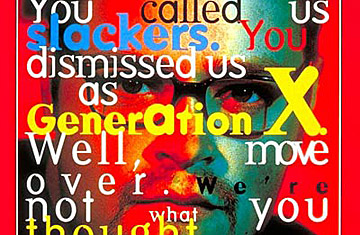
(2 of 4)
If twentysomethings entered the decade floundering in the job market, did they deserve to be labeled dazed and confused? They had come of age after the U.S. took what some economists call the great U-turn. Energy prices first soared in 1973, and workers' wages stagnated. Between 1979 and 1995, some 43 million jobs were lost through corporate downsizing. Newly created jobs paid less and offered fewer benefits. Sharp cutbacks in federal grants since 1981 mean that 1 of 3 students works and attends school at the same time. Says Paul Rogat Loeb, author of Generation at the Crossroads, a study of college students: "The issue today is finding a job--in a fragmented workplace--that will allow them to avoid being crushed by their loan payment."
While the economy is improving to the point that many of this year's college graduates have multiple job offers, the climate of the early '90s left its mark on the generation. Sixty-one percent of Xers told Dream study pollsters, "Worrying about the future is a major source of stress"--far more so than for their parents or grandparents. More than three-quarters of Xers say, "No matter what I plan for the future, when I finally get there, it's always something different." Some opt out of the rat race. "What seems like apathetic hedonism actually represents a fairly informed bet," American Demographics columnist Marc Spiegler wrote recently. "Why put up with the cubicled world's woes when its promised delayed gratification is an ever more dicey proposition?" The slogan on Eddie Bauer's shopping bags puts it succinctly: "Never confuse having a career with having a life."
But rather than electing to tune in, turn on and drop out, Gen Xers are proving to be deeply competitive. Back when bumper stickers exhorted one to make love not war--in 1973, to be exact--only two-thirds of twentysomethings polled by Yankelovich agreed that "competition encourages excellence." Today 82% of their counterparts say, "I like to compete: it makes me perform better." The recent surge of extreme sports--from bungee jumping to sky surfing--is no accident. The hip slogan of the Gen X T shirt? NO FEAR. Indeed, adversity, far from discouraging youths, has given them a harder, even ruthless edge. Most believe "I have to take what I can get in this world because no one is going to give me anything." And 71% of Gen Xers--a higher percentage than their parents or grandparents--believe "In this world, sometimes you have to compromise your principles." Do they identify more with success or integrity? More than half choose success; only a third of their elders select it.
High-tech wunderkinder, such as Yahoo! Web-search founders Jerry Yang, 28, and David Filo, 31, are role models because of their affinity for risk and their entrepreneurial spirit. Some advertisers have caught on. Two years ago Prudential replaced its longtime slogan "Get a Piece of the Rock," with the more enterprising "Be Your Own Rock." As the Dream study describes it, this is the new "generation on the make." While interest in corporate careers is sliding, business schools have expanded their courses in entrepreneurialism. A recent University of Michigan study found that 25-to-34-year-olds are trying to start businesses at three times the rate of 35-to-55-year-olds. "Having your own business means not worrying about what some head guy in Dallas thinks," says Sky Eacrett, a Redlands, Calif., tile-store manager who dreams of striking out on his own. "No matter how much money you make for them, you are still just an x. And you can be x-ed off. With my own business, I could come in at 7 a.m. and leave at noon to play golf."
MATERIAL GIRLS AND BOYS
Voter participation is dropping in all age groups but in none so steeply as among 18-to-24-year-olds, less than a third of whom voted in last year's presidential election. A generation ago, in 1972, 42% of this group went to the polls. But those were the days when young people still believed they could change the world. In 1966, President Lyndon Johnson's poverty chief, Sargent Shriver, predicted the war on poverty would be won "in about 10 years." Today everyone knows better, and Gen X was molded during that learning process. "In the old days, politicians at least pretended to have principles," laments Beth Englander, 26, a former VISTA volunteer. "Now they're not ashamed to switch values just to get elected. Every time we hear of a new scandal, we're, like, 'Yup!'" she says with a shrug.
Although Xers tend to be more liberal and Democratic than the general population--53% voted for President Clinton, vs. 34% for Bob Dole--12 years of growing up under Reagan and Bush imbued them with a distrust of government. "The do-it-yourself, no-one-is-going-to-look-out-for-me-but-me spirit among Xers is a product of coming of age when that was the message coming from the Administration," says Mia von Sadovsky, 29, an ad-agency researcher. "We have hard-wired into us a different approach to getting things done." A survey by Third Millennium found that 53% of Gen Xers believe that the TV soap opera General Hospital will outlast Medicare. If permitted, 59% of Xers would opt out of Medicare and save on their own. Of any adult generation, they have the weakest attachment to political parties, and in 1992 Gen Xers cast a higher percentage of votes for Ross Perot than older adults did. "We have a libertarian streak," says Thau. "We grew up in a period with one instance of government malfeasance and ineptitude after another, from Watergate to Iran-contra to the explosion of the Challenger to Whitewater. We believe government can't be trusted to do anything right."
